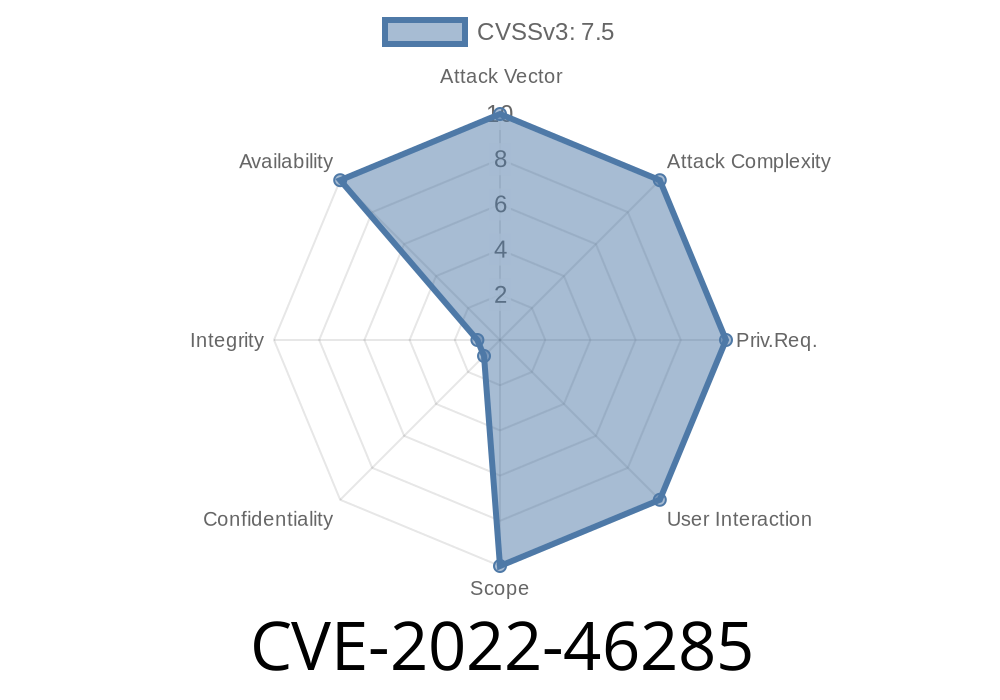In late 2022, security researchers reported CVE-2022-46285, a vulnerability in libXpm—the widely used C library for XPM image parsing, part of the X.Org project. This seemingly niche issue can have a significant impact: it allows remote Attacks to trigger an infinite loop, consuming CPU resources and causing a complete Denial of Service (DoS) in any application using libXpm to handle images.
Let's break down how this bug works, see the code involved, learn how an exploit looks, and discuss practical impact and mitigation.
What Is libXpm?
libXpm is a library for reading, writing, and manipulating XPM (X PixMap) image files, which are mainly used for storing simple bitmap images in a plain text format. Many *legacy* applications in Linux desktops and toolkits still support XPM.
The Flaw Explained
CVE-2022-46285 is a parsing vulnerability. It occurs when libXpm reads an XPM file containing a comment that isn't closed (that is, you have a /* comment that never ends with */).
The original parser's comment-handling logic did not account for the end-of-file (EOF) condition when searching for the closing */, so it would keep parsing—forever. As a result, the application linked with libXpm would hang and "eat" CPU cycles, leading to denial of service.
Key scenarios
- Any user or attacker able to provide an XPM image to a vulnerable program (think: file viewer, desktop app, icon handler) can freeze that process.
The Code: Where the Bug Lived
The vulnerable code is in the function that skips over comments:
/* Before the fix */
while ((c=Getc()) != EOF) {
if (c == '*') {
if ((c=Getc()) == '/') break;
else Ungetc(c);
}
}
/* If '*/' is never found, this loop runs forever! */
What's happening here?
- The code consumes characters, expecting to encounter a */ pair to end the comment.
- If the input file never gives that pair and reaches EOF instead, the loop never breaks (because the EOF check is inside the while, not inside the inner check!).
With a malicious file
/* This comment never ends...
static char *icon[] = {
"1 1 1 1",
"A c #000000",
"A",
};
Save the following as doomsday.xpm
/* This is a deadly unclosed comment!
static char *sample[] = {
/* No closing */
"1 1 1 1",
"A c #000000",
"A"
};
Test with a vulnerable app
For example, running ImageMagick, GIMP, or any XPM viewer utility will cause that process to become stuck.
# Replace 'your-xpm-viewer' with any app that opens XPM files using libXpm
your-xpm-viewer doomsday.xpm
# Observe: process never completes, eats 100% CPU
Reference Links
- CVE-2022-46285 NVD Entry
- X.Org libXpm Issue Tracker
- Patch Commit Fixing the Bug
- Debian Security Advisory DSA-5349-1
How Was It Fixed?
The fix was pretty simple:
Properly check for EOF _inside_ the comment-scanning logic.
- If EOF is reached before finding */, break out of the loop and handle the parsing error gracefully.
Fixed code snippet
while ((c=Getc()) != EOF) {
if (c == '*') {
int d = Getc();
if (d == '/') break;
else if (d == EOF) break; // <-- crucial fix!
else Ungetc(d);
}
}
The patch ensures the parser doesn't spin forever on bad files.
Affected: Any program that uses libXpm < 3.5.15 (all old versions!)
- Attack Vector: Any untrusted XPM file. Could be triggered by opening a malicious file or getting a desktop environment to load a bad icon.
- Result: Frozen app, denial of service, possible system resource exhaustion if multiple apps are attacked.
Update libXpm!
Distros have shipped fixed packages since late 2022/early 2023. Check your version and update.
Conclusion
CVE-2022-46285 is a classic example where a simple parser oversight can cause serious application disruption. Always handling all input edge cases, including premature EOF, is crucial when reading from files!
References and further reading
- CVE-2022-46285
- X.Org Security Advisory
- libXpm main repo
Stay secure: keep your libraries up to date and don't trust image files—no matter how harmless they look!
Timeline
Published on: 02/07/2023 19:15:00 UTC
Last modified on: 03/03/2023 16:15:00 UTC
